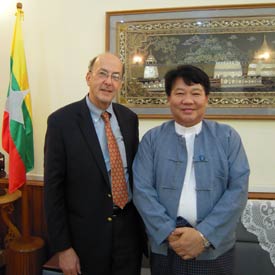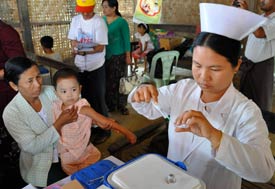Fogarty director Dr Roger I Glass joins US health delegation to Burma
May / June 2012 | Volume 11, Issue 3

Photo courtesy of U.S. State Department
Fogarty Director Dr. Roger I. Glass (left) visited
Burma recently to discuss possible research
collaborations with the country's health minister,
Dr. Pe Thet Khin.
As part of the warming of relations between U.S. and Burma, Fogarty Director Dr. Roger I. Glass recently traveled to Rangoon to represent the U.S. at an international science meeting and to discuss possible research collaborations with the country's health minister.
"The Burmese are very enthusiastic about engaging with the U.S. scientific community to advance their research efforts in HIV/AIDS, malaria, dengue, and maternal and child health in particular," observed Glass. "I was very impressed with the caliber of scientists I met and look forward to establishing research and training collaborations with them."
In his role as lead U.S. health representative, Glass participated in the meeting of ASEAN's Committee on Science and Technology. He proposed that Fogarty and its federal partners host an influenza workshop in the region later this year, which was met with enthusiasm.

Photo by Christopher Endean / GAVI Alliance
The U.S. has lifted sanctions against Burma and
is encouraging closer ties between the two
countries, paving the way for NIH to establish
research partnerships.
He also discussed ways to increase collaboration in research with the country's health minister, Dr. Pe Thet Khin, a U.K.-trained pediatrician. While in Burma, Glass visited the Department of Medical Research and met with former Fogarty trainees, many of whom received advanced instruction in infectious diseases research under an AIDS training grant to UCLA.
"It was remarkable that the rotavirus surveillance set up in Burma more than a decade ago is still providing meaningful and timely data on the burden of disease," noted Glass.
His three-day visit coincided with an announcement by Secretary of State Hillary Rodham Clinton to end sanctions against Burma, take steps to permit American investment there and appoint a U.S. ambassador to the country, the first since 1990.
"We say to American business: Invest in Burma and do it responsibly," Clinton urged. "Be an agent of positive change and be a good corporate citizen; let's all work together to create jobs, opportunity, and support reform."
Clinton pledged the U.S. will be careful to encourage responsible investment and deter human rights abuses. The private sector will be a full partner, she said, and U.S. businesses are encouraged to set a good example of doing business in a transparent, responsible manner.
More Information
To view Adobe PDF files,
download current, free accessible plug-ins from Adobe's website.